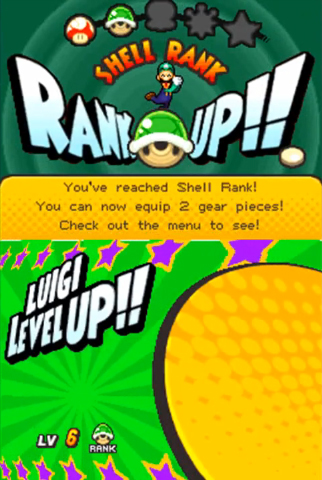Overview
The concept of a winning "score" is as old as action games themselves, dating back to Space Invaders. The highest score achieved in a finite amount of time determines the winner and player rankings. During the golden age of arcade games (late 1970s to mid-1980s), organizations such as Twin Galaxies were formed to nationally rank player scores for popular arcade games such as Space Invaders, Pac-Man and Donkey Kong. Modern games (real and electronic) have grown to a level of complexity that involves statistics to track the ability and ongoing progression of its players, based on multiple factors.
This "system" concept deals with multiple elements of player progression and accomplishment. A key element is to spur the player to improve his or her best attempt, or surpass another player's attempt. One method might display a screen that measures the results of the player's activity, another might allow them to "rank-up" after reaching a target goal. PlayStation Trophies award a platinum after acquiring all the others as a badge of rank. Xbox Live Achievements do not, but the player's Gamerscore number can be compared and ranked against other players.
Elements of Rank
Statistics used to determine an overall rank may include: score, time, goals accomplished, accuracy, items collected, items used, kills made, damage taken, steps taken, moves made, decision tree choices, calories burned, etc. Any aspect of player control, choice, or progression can be broken down to a relative measurement of skill, within the parameters of success that the game establishes. Games will vary greatly in how much of this raw data is shared with the player, regardless of how much is tracked.
Reporting of Rank
 Luigi earns a Shell Rank in Mario & Luigi: Bowser's Inside Story.
Luigi earns a Shell Rank in Mario & Luigi: Bowser's Inside Story.The two most common methods to report/display a rank are letter (i.e. "A" or "S") and number grades (i.e. 1st, 2nd). Other methods include time counters, stars, icon badges, medal emblems, or named tiers, but these are often just a different visual representation of what is simply a numbered list. Reports of a player's rank may be displayed after the completion of a game, completing individual stages, or even while completing individual goals.
A single player game that keeps score, has time trials, and a stat tracking screen to display completion percentage, might not involve anything resembling a rank. Super Mario 64 is an example of this, and would not be included here unless it also had minigames that do award a rank. Mario and Luigi: Bowser's Inside Story includes a rank system that is directly related to the experience leveling system.
Boasting of Rank
Before the advent of online play, proving skill at a game required friends to be in the room, troublesome photography of TV screens, or playing in an arcade with a crowd of witnesses. With online play in closed systems such as Xbox Live, enough safeguards are normally in place that a player who is not deliberately trying to circumvent the system can be confident their ranking on a leaderboard is accurate.
Even single player games built with online connectivity in mind, such as Shadow Complex and Trials HD, are using stat tracking in interesting ways. By displaying the scores of other players and friends directly in-game, a sense of competition and motivation for improvement is greatly enhanced.
For professional gaming and world record play, organizations such as Twin Galaxies are established authorities in ranked score keeping on multiple platforms.
Online Cheaters and Design Issues
A common complaint and unresolved issue in online gaming is deliberate network connection loss (aka Rage Quit). To avoid the penalty of losing a match, some soulless players will disconnect themselves before a loss can be recorded. The debate on this issue continues as developers work toward finding the right balance of anti-cheating philosophy, versus giving all players the benefit of the doubt for problems inherent to technology.
Log in to comment